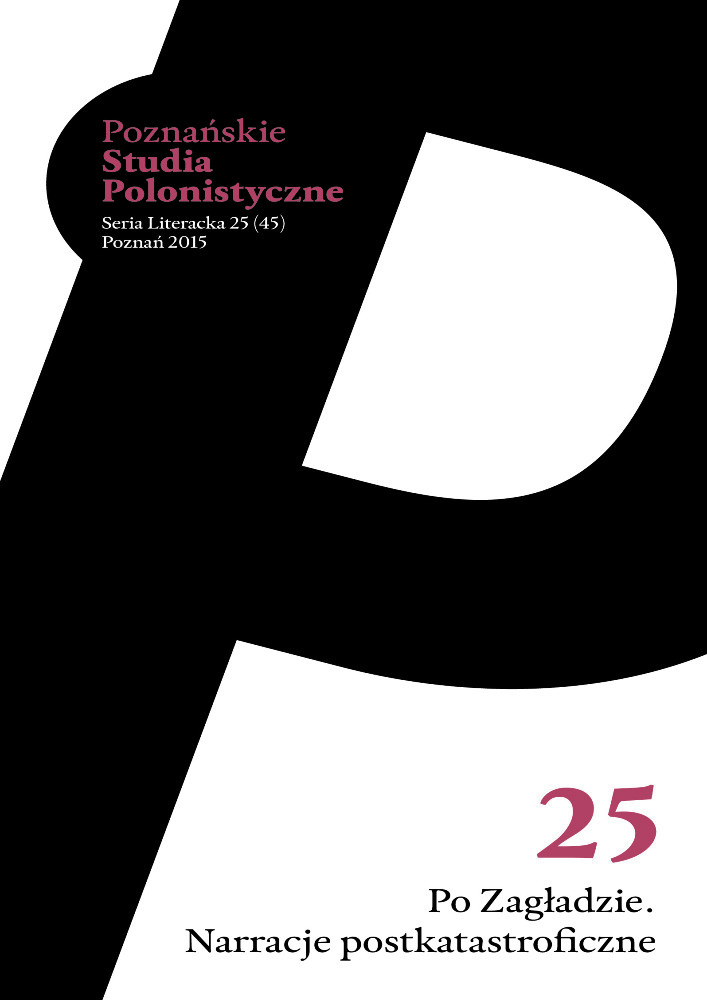Abstract
The article discusses a special kind of narrative about the catastrophe, treated as a specific genre of writing: the theory of literature of the Holocaust. The article presents its two most significant (although not the only ones) features: firstly, the conviction about its unusual character as compared to other genres/forms of writing, sometimes secretly described by such concepts as the uniqueness of the Holocaust (which metonymizes not only the event itself but also the narrations referring to it) and, secondly, identifies all text-producing entities (narrator, author etc.), simultaneously constituting the basic feature of the most important genre/modality of this kind of writing which is testimony. The article presents the examples of Polish and foreign scholars portraying this state of affairs.References
Ball Karyn (2008), Disciplining the Holocaust, SUNY Press, Albany.
Berger Alan (1982), Academia and Holocaust, „Judaism: A Quarterly Journal of Jewish Life and Thought”, nr 2, s. 167-169.
Dawidowicz Lucy (1975), The War against the Jews, 1933-1945, Holt, Rinehart and Winston, New York.
Eaglestone Robert (2000), Doing English. A Guide for Literature Students, Routledge, London.
Eaglestone Robert (2004), The Holocaust and the Postmodern, Oxford University Press, Oxford.
Eaglestone Robert (2007), Identyfikacja a świadectwo jako gatunek, przeł. Tomasz Łysak, „Teksty Drugie”, nr 5, s. 11-33.
Engelking Barbara (1996), Czas przestał dla mnie istnieć – analiza doświadczania czasu w sytuacji ostatecznej, IFiS PAN, Warszawa.
Franklin Ruth (2011), A thousand darknesses: lies and truth in Holocaust fiction, Oxford University Press, Oxford.
Głowiński Michał (1986), Cztery typy fikcji narracyjnej, w: Teoretycznoliterackie tematy i problemy, red. Janusz Sławiński, Ossolineum, Wrocław, s. 25-34.
Głowiński Michał (2005), Wprowadzenie, w: Stosowność i forma: jak opowiadać o Zagładzie?, red. Michał Głowiński, Universitas, Kraków, s. 7-20.
Głowiński Michał (2011), Realia, dyskursy, portrety: studia i szkice, Universitas, Kraków.
Gromadzki Stanisław, Mościcki Paweł, Papieski Robert, Romaniuk Radosław (2004), Zagadywanie katastrofy. Rozmowa z profesorem Michałem Pawłem Markowskim, „Przegląd Filozoficzno-Literacki”, nr 4(10), s. 11-26.
Hilberg Raul (2014), Zagłada Żydów europejskich, t. I–III, przeł. Jerzy Giebułtowski, Wydawnictwo Piotr Stefaniuk, Warszawa.
Hungerford Amy (2003), The Holocaust of Texts: Genocide, Literature, and Personification, University of Chicago Press, Chicago.
LaCapra Dominick (2009), History and Its Limits: Human, Animal, Violence, Cornell University Press, Ithaca.
Lang Berel (2000), Holocaust Representation. Art within the Limits of History and Ethics, John Hopkins University Press, Baltimore.
Lang Berel (2006), Nazistowskie ludobójstwo: akt i idea, przeł. Anna Ziębińska-Witek, Wydawnictwo UMCS, Lublin.
Langer Lawrence (1975), The Holocaust and the Literary Imagination, Yale University Press, New Haven.
Lefkovitz Lori Hope (2001), Inherited Holocaust Memory and the Ethics of Ventriloquism, w: Shaping Losses: Cultural Memory and the Holocaust, red. Julia Epstein, Lori Hope Lefkovitz, University of Illinois Press, Urbana, s. 35-43.
Leociak Jacek (1997), Tekst wobec zagłady: o relacjach z getta warszawskiego, Leopoldinum, Wrocław.
Milchman Alan, Rosenberg Alan (2003), Eksperymenty w myśleniu o Holocauście: Auschwitz, nowoczesność i filozofia, Scholar, Warszawa.
Rosenfeld Alvin (2003), Podwójna śmierć: rozważania o literaturze Holocaustu, przeł. Barbara Krawcowicz, Cyklady, Warszawa.
Schoenfeld Gabriel (1998), Auschwitz and the Professors, „Commentary”, nr 105/6, s. 42-46.
Schwarz Daniel (1999), Imagining the Holocaust, St. Martin’s Press, New York.
Shallcross Bożena (2010), Rzeczy i zagłada, Universitas, Kraków.
Sławiński Janusz (1976), Zaproszenie do tematu, w: Literatura wobec wojny i okupacji, red. Michał Głowiński, Janusz Sławiński, Ossolineum, Wrocław, s. 7-15.
Vice Sue (2005), Literatura Holokaustu, przeł. Tomasz Dobrogoszcz, „Literatura na Świecie”, nr 9-10, s. 251-263.
Volkman Ernest (1982), A Legacy of Hate. Anti-Semitism in America, F. Watts, New York–London–Toronto–Sydney.
Weismann Gary (2004), Fantasies of Witnessing. Postwar Efforts to Experience the Holocaust, Cornell University Press, Ithaca–London.
License
Authors
Authors of texts accepted for publication in „Poznańskie Studia Polonistyczne. Seria Literacka” are required to complete, sign and return to the editor's office the Agreement for granting a royalty-free license to works with a commitment to grant a CC sub-license.
Under the agreement, the authors of texts published in „Poznańskie Studia Polonistyczne. Seria Literacka” grant the Adam Mickiewicz University in Poznań a non-exclusive, royalty-free license and authorize the use of Attribution-NoDerivatives 4.0 International (CC BY-ND 4.0)Creative Commons sub-license.
The authors retain the right to continue the free disposal of the work.
Users
Interested Internet users are entitled to use works published in „Poznańskie Studia Polonistyczne. Seria Literacka” since 2016, for non-commercial purposes only, under the following conditions:
- attribution - obligation to provide, together with the distributed work, information about the authorship, title, source (link to the original work, DOI) and the license itself.
- no derivatives - the work must be preserved in its original form, without the author's consent it is not possible to distribute the modified work, such as translations, publications, etc.
Copyrights are reserved for all texts published before 2016.
Miscellaneous
Adam Mickiewicz University in Poznań retains the right to magazines as a whole (layout, graphic form, title, cover design, logo etc.).
